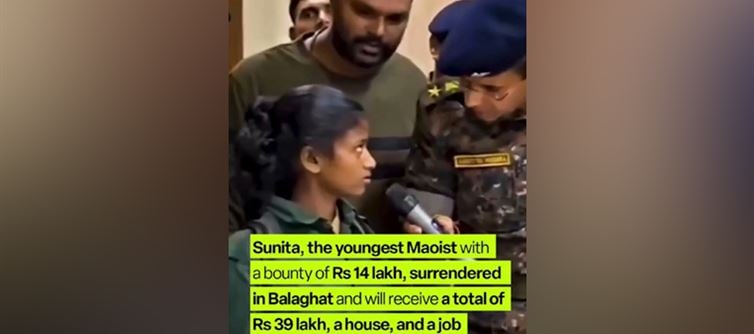
The Story That Should Anger Every Honest Indian
Meet Sunita Oyam.
Once part of an armed Maoist outfit — a movement that has taken thousands of innocent lives and terrorized entire districts.
After years in the jungles, she surrenders.
And what does she get?
A ₹39 lakh rehabilitation package, a government job, and a house.
That’s not rehabilitation. That’s a reward.
Meanwhile, the same government that struggles to release pending pensions, tax refunds, and scholarship arrears moves heaven and earth to pamper someone who once pointed a gun at the state.
The Twisted Logic of “Rehabilitation”
Governments defend these payouts as “rehabilitation schemes.” The argument is simple — “bring them back into society.”
But here’s the reality:
The state now treats rebellion like a career option.
Commit violence, surrender, collect benefits.
The system teaches a chilling lesson:
It’s not profitable to obey. It’s profitable to oppose.
For a common taxpayer, compliance is a duty.
For a surrendered extremist, compliance is currency.
Who Really Pays the Price
Every rupee given as a reward for surrender is taxpayer money — the same taxpayer who spends his life fighting bureaucracy just to get a driving license or school seat.
Imagine slogging for 30 years, paying income tax, property tax, GST, cess after cess — only to see your hard-earned money used to rehabilitate those who waged war on your country.
When governance begins to fear the gun more than it respects the law, it stops being governance. It becomes appeasement.
The Moral Black Hole
Rehabilitation is necessary for peace. But where is the moral balance?
When an ex-rebel gets a salary before a retired soldier, when a surrendered extremist gets a house before a homeless farmer — something fundamental has broken.
The government calls it “mainstreaming.”
But when the mainstream itself feels cheated, what peace are we really achieving?
The Root of the Rot: politics Over Principle
Why does the state do this? Because it’s cheaper to buy peace than to build justice.
It’s easier to announce payouts than to fix governance in remote districts.
Decades of neglect and corruption have turned large parts of india into fertile ground for Maoist recruitment.
Instead of addressing that, governments across parties throw money at the symptom and ignore the cause.
Every “rehabilitated” extremist is proof that the system failed long before the rebellion began.
The Forgotten Citizen
There’s a quiet, unseen majority in this country — law-abiding, over-taxed, under-thanked.
They don’t block highways.
They don’t pick up guns.
They just work, earn, and hope the system will someday work for them.
But the message from stories like this is clear:
The honest citizen funds the dishonest one.
The peaceful funds the violent.
The taxpayer funds the traitor.
Rehabilitation Without Accountability Is Surrender
If someone genuinely reforms, fine — give them a chance.
But where’s the accountability?
Where’s the transparency on whether these people were involved in murders, extortion, or bombings?
Why aren’t victims’ families compensated first?
Why aren’t surrender packages tied to public disclosure of past crimes and monitoring of future conduct?
Without that, it’s not reform. It’s amnesty without justice.
Final Word: The Cost of Compassion
india has always believed in forgiveness. But forgiveness without fairness is foolishness.
When the state rewards those who terrorize it, while ignoring those who built it, it sends a dangerous message —
That power doesn’t come from contribution; it comes from coercion.
Until the government learns to value loyalty as much as it fears rebellion,
India will keep punishing the law-abiding and rewarding the lawbreakers.
And someday, there may be no taxpayers left to pay for that compassion.




 click and follow Indiaherald WhatsApp channel
click and follow Indiaherald WhatsApp channel